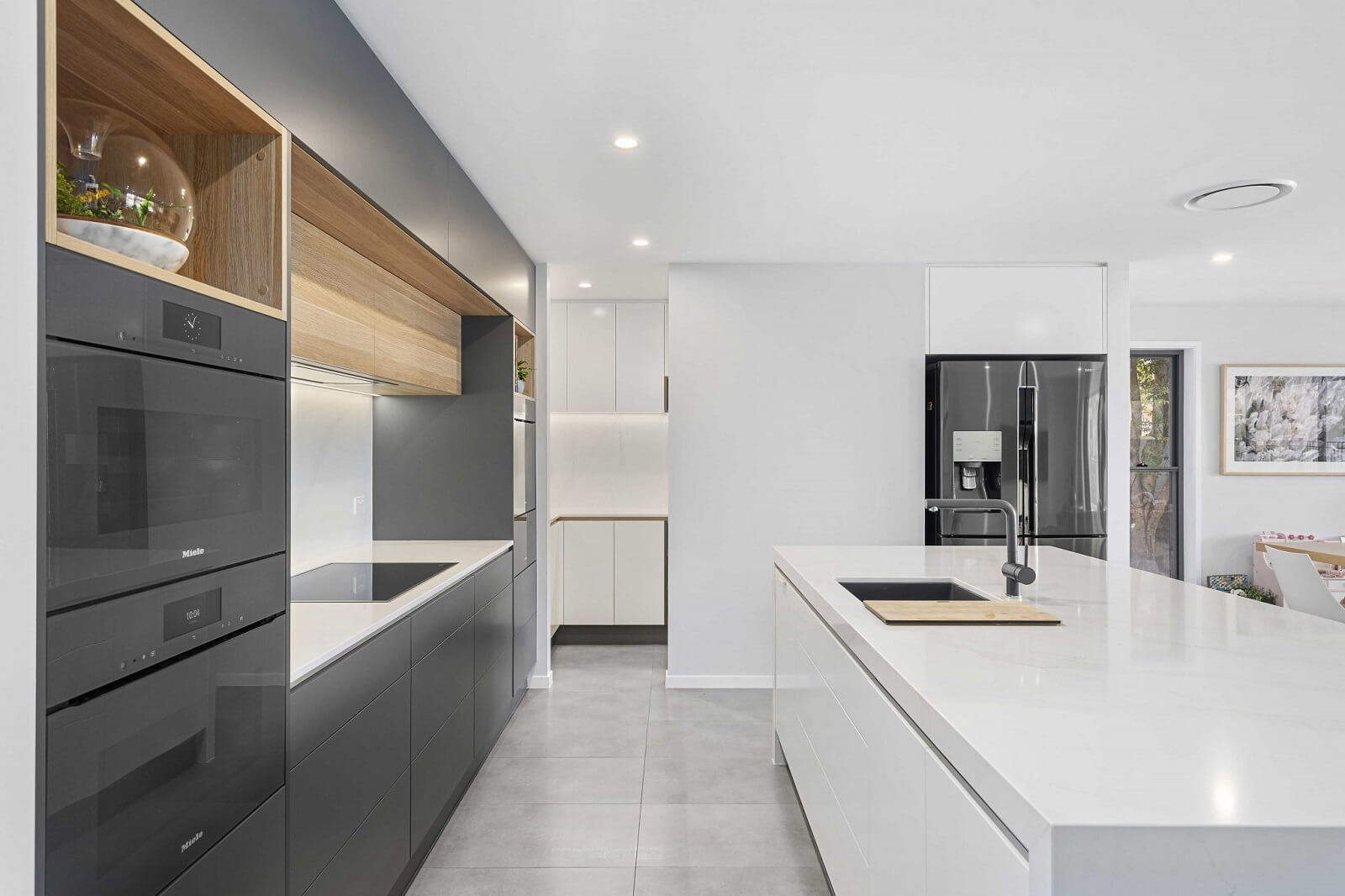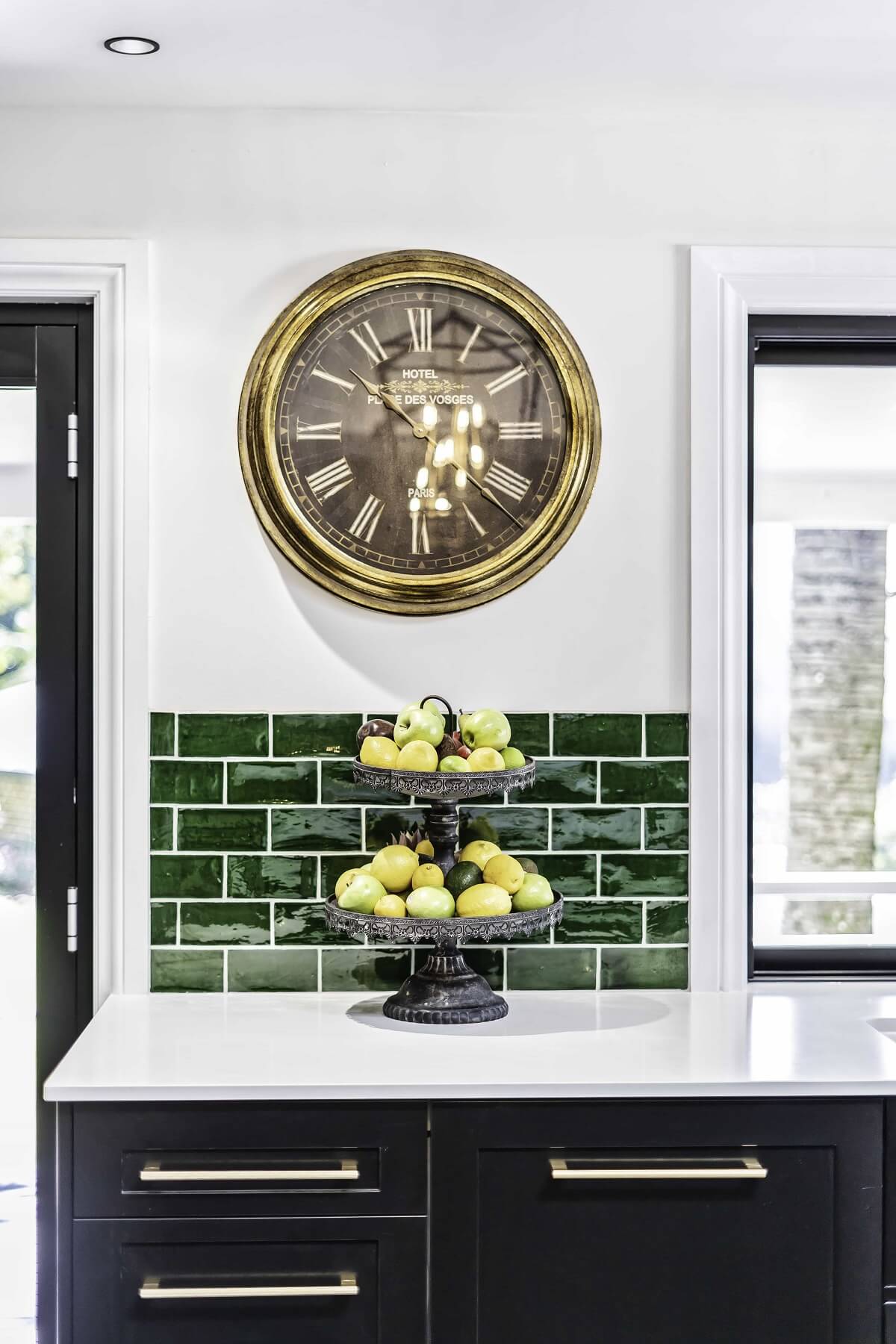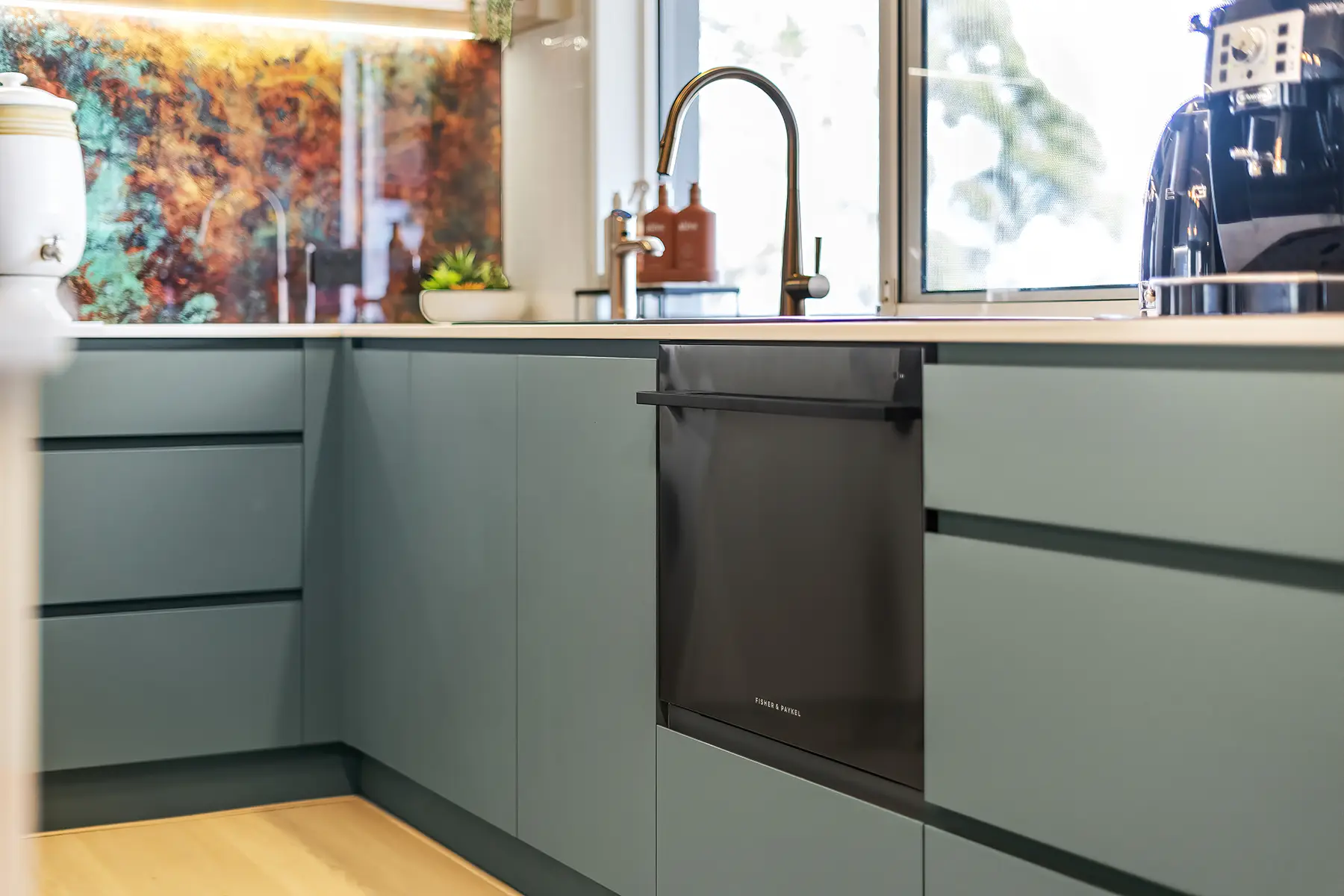Introduction to Colour Psychology in Kitchen Design When embarking on a kitchen renovation or design…

Make your kitchen renovation smooth sailing—with a temporary kitchen and other hot tips!
Deciding to engage in a full kitchen renovation can be a daunting task, especially if this is your first time or you have had an unfortunate experience renovating in the past. There are many expert tips we can provide you—which you can take onboard to help guide you through the planning, design and construction phases of your kitchen renovation. Having an in-depth understanding of what exactly is involved with your kitchen renovation and estimated timings for particular tasks—will really help you obtain insight of the intricate nature of a kitchen renovation. All this information will allow you to create a detailed renovation plan that will see to your renovation experience being as smooth sailing as possible.
What is the average time frame of a kitchen renovation?
Your standard kitchen renovation can take anywhere from one to three months. This can definitely vary depending on the level of work you require too. There is the rare potential here for unexpected blowouts to hinder this timeframe—or you may be pleasantly surprised at how fast your extensive renovation process was. Faster and higher quality renovations are generally completed by teams that consist of certified professionals, such as the team at BJF Joinery.
There are many alternate elements that need to be factored into your kitchen renovation timeline too—such as interviewing contractors or renovation companies, the planning stage, material selection, the ordering of product and general wait times.
*Please note that all timings mentioned in this article are simply approximates and are in no way guaranteed for your renovation. They are intended to be used as an informative estimate only to help with your overall planning process.
Your estimated timeline of the major kitchen renovation phases:
- Interviewing contractors and renovation companies: 2-4 weeks
- Designing, making material selections and estimating costs: 1-4 weeks
- Ordering materials, waiting for products to arrive and obtaining permits: 1-4 weeks
- Demolition, building and clean-up: 2-4 weeks.
In-depth approximate breakdown of your kitchen renovation:
- Clear the old kitchen: 2 days—this stage is the messiest of all, as the cabinets are removed, flooring is removed, tiles come off walls and floors and all the fixed appliances are taken out of the space. Depending on your plans, the sink is removed and any water and waste pipes sealed off. This is the stage where your team will conduct a search for any structural damage to the walls or floor and make sure gas and electrical supplies are safely secured.
- Clean-up/repairs: 2 days—your chosen team will have an initial clean-up then carry out any repairs, such as filling holes in the walls, repairing any damage to the flooring or removing any wiring or piping that is going to be replaced.
- Cabinet-making: 10 days—this often takes place in a specialist workshop and the work is scheduled so the cabinets are ready for installation when all the other work is completed. Your design and planning would have come well before this phase of construction.
- Plumbing: 2 days—the plumber makes any changes needed to water and waste supplies for the sink and dishwasher.
- Electrical work: 2 days—the electrician runs cables to the correct positions for any new lighting, power points for the worktops and fixed power points for any of the major appliances. If appliances are in new positions, the electrician will have to cut and make new channels in the walls to accommodate these. Connecting and testing new cabling to existing circuits and updating the safety switch is also included in this time frame.
- Plastering: 2-4 days (plus drying time prior to painting)—plasterers will repair any damaged surfaces around old tiling or power points. In some cases, they may install a ‘dry wall’ to conceal any pipe work or other surface fittings. Plasterers apply a first coat, which will allow the plaster to dry and then they finish with a skim coat.
- Painting: 2-3 days—painters apply a first watery coat on new plaster once it has dried, which can take several days depending on your environment and chosen paint. They then finish with one or two coats of your chosen colour.
- Tiling: 2-3 days—tiling work is often minor in a kitchen renovation, this may be in the form of a splashback behind the sink and a protective layer of tiles or a heat-resistant panel behind the cooker. Floor tiling is separate to this.
- Flooring: 1-2 days—flooring might take place before or after cabinets and fixed appliances are installed. Vinyl flooring takes just a few hours, but stone, tiled or wooden flooring will take longer, particularly if there are complex shapes to cut around cabinets or island units.
- Installation: 4-5 days—your chosen team of professionals are now able to fit cabinets and benchtops, then install the fixed appliances. The electrician connects and tests appliances, power points and lighting, and the plumber and gasfitter connects the sink, dishwasher and any gas appliances. The painter might have to touch up any areas damaged during the installation process.
- Inspection: 1/2 day—any electrical, gas or plumbing work is inspected to make sure it is safe and compliant with your local regulations.
The above schedule consists of about 20 days of work, and obviously doesn’t include any planning, personal cleaning, interviewing, or extra work that you may want to conduct on your own accord. Regardless of the timeframe taken for your particular project—a new kitchen is a fantastic investment for your home that will increase the value and liveability of your space immensely.
Create a temporary kitchen.
If you’re planning your renovation, even going one to three months without a kitchen can be irritating, particularly if you have a large family. If you don’t have the ability to move out of your home temporarily during the renovation (which many don’t), create a makeshift kitchen that can act as your temporary cooking space to make the renovation process far more comfortable. Eating out every night may seem appealing at first but this will become less appealing as the days drag on. Nothing can beat a nutritious home cooked meal—so set-up your makeshift kitchen with everything you would need for cooking and cleaning your space over the coming weeks. This can be as luxury or as simple as you desire.
Your temporary kitchen checklist:
- Microwave
- Electric kettle
- Minimal non-perishables such as soup, condiments, cereal, tea, coffee, sugar, rice, pasta etc.
- Microwave-safe cooking dishes
- Slow cooker
- Grilling tools
- Coffee machine
- Bare minimum crockery, cutlery, cups and utensils (or disposable)
- Dishcloths, paper towels and garbage bags.
- Tea towels and cleaning spray.
- Plastic washing up basin
- Fridge/freezer or Esky/cooler
- BBQ outside for meal variation
- Portable electric hotplate or induction hotplate
- Pack all other non-essential kitchen items away in carefully labelled boxes ready to transfer to your new kitchen.
The laundry is a great spot for a temporary kitchen.
A laundry room makes a great area of the home to host your temporary kitchen during your main kitchen renovation. To be safe, ensure that you separate food prep areas from dirty clothes and harmful detergents as you don’t want any cross contamination to occur. If the space and configuration of your home allows you, the laundry is ideal because it is already a “wet” area, however, care must be taken due to the hazardous items that lurk within. Ensure you have enough storage space and access to running water. You’re going to want to separate your cooking area from your washing area by allowing for designated detergent free storage. You may want to disinfect and thoroughly clean certain shelves or cupboards to house your cooking appliances—create spaces that are free from washing chemicals for such items. Keep the bench space you use for food prep strictly separated from your laundry area. If you have heavy kitchen equipment or appliances such as a microwave, sandwich press or a kettle, keep these on flat, stable surfaces to ensure they don’t fall unexpectedly.
A makeshift kitchen alternative.
If you don’t have the laundry space, you can use a bookshelf, cabinet or generic drawer unit to store your kitchen appliances and food supplies. These options can be positioned in a corner of your living room or home office to make and store food. Then you can use the bathroom sink or bathtub in your bathroom to wash your dishes. Place your temporary kitchen away from thoroughfares and renovation work for peace and quiet. Keep it away from the kitchen remodel as this is an area where dust will be flying around and people are constantly walking in and out of. Concentrate your temporary kitchen in one area for your convenience, as you don’t want it spread all around the house as this can be messy and stressful. Stay away from rooms with carpet—as spills will be far more difficult to clean up on carpet. Plan to do the dishes in a plastic basin if using your bathroom facilities isn’t ideal. If you will have very limited access to running water, you can use disposable plates and cups for the duration of your renovation.
Food storage ideas.
Move your old refrigerator, small mini-fridge or Esky to a convenient space close to a water source. Small appliances such as microwaves, toasters or toaster ovens, portable hot plates, slow cookers and small electric grills will be immensely helpful in preparing home-cooked meals. Prior to the renovation, fill the freezer (providing you are keeping your fridge/freezer in the house during the renovation phase) full of easily microwavable meals such as soups, stews,
pasta sauces and pies.
Phone a friend.
If available to you—try reaching out to a friend or family member to ask if you can use their kitchen to prepare meals during your renovation. Often close friends or family members may live in close proximity to you, and are more than happy to let you use their kitchen to cook some meals in. You can prep items in bulk so you don’t have to resort to chopping and marinating in your living room or laundry room. This way you can throw the prepared ingredients into your slow cooker at home or use your hotplate to create fast stir frys.
Keep your pets out of the construction zone.
Just as you would with yourself or your children, ensure your pets are not wandering around the construction zone as they may cause disruptions or worse—injure themselves. Use baby gates to section off your home to protect your pets from potential injury.
Keep your life as normal as possible.
The ideal way to deal with the disruption of a kitchen renovation is by planning ahead to ensure you keep as much normalcy in your life as possible. It is achievable through expert planning and using some of the smart methods discussed in this article to ensure your family is as safe and comfortable as possible during the kitchen renovation process. This may cause some temporary disruptions to your life, but the outcome of a newly renovated kitchen will make it all worth it. If living amongst construction gets to be too much, it’s okay to give yourself a break. Take some time away from the construction and let yourself mentally reset. Book a hotel for a night, visit family or a friend and let yourself eat out often if need be. Opting for a timeless or contemporary minimal kitchen design plan, will mean you won’t have to renovate again anytime soon. Enjoy your planning phase, and plan ahead to ensure you are more than equipped to successfully survive your upcoming kitchen renovation.
Get your kitchen renovation quote today!
If you are wanting to engage a team of trusted professionals for your upcoming kitchen renovation, be sure to reach out to BJF joinery today! The BJF Joinery team consists of a team of completely qualified and meticulous professionals who deliver striking results for a range of Queenalnd based customers. Regardless of the size of your home or kitchen floor plan, BJF joinery will ensure you get the ultimate luxurious feeling kitchen in a timely and cost-effective manner. They have a team of expert design specialists who will help you bring your wildest kitchen dreams to life. Nothing is too big or too small for the team at BJF Joinery.


